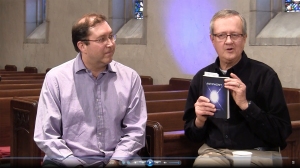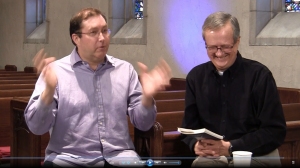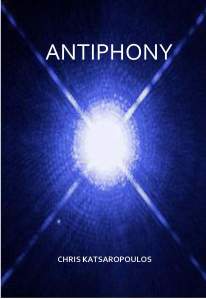The Right Key by Wayne G. Boulton
Interview with Chris Katsaropoulos, author of Antiphony
View the youtube video of the interview here.
“He knows.”
So ends Chris Katsaropoulos’s compelling second novel about the precipitous fall of Theodore Reveil – an eminent scientist whose lifelong pursuit of knowing and knowledge was tracking nicely with the Great Commandment (“You shall love the Lord your God…” Jesus said, “with all your mind”) before breaking out into the open in unprotected fashion and at exactly the wrong time. In a meeting of his peers, Ted chooses to touch the ‘third rail’ of modern physics.
That would be God, or that would be referring to God, or that would be referring to God in a sentence that is not negative.
So the dramatic arc in Antiphony is clear from the outset. It is the story of a descent. But the fall of Theodore is only the springboard in this novel, not its heart. Katsaropoulos – an accomplished writer and poet, and a long-standing member of 2nd Presbyterian Church – has other fish to fry. He wants to draw us in to the heart and mind and emotions (“the chest,” C. S. Lewis once called it) of a top-tier particle physicist at the summit of his career.
Without dumbing down, Katsaropoulos’s aim is a kind of inner physics, i.e., to get readers to see and feel the world as Ted sees and feels it. There is no excluding, even for a moment, the herculean drive in and of Ted’s profession to explain the universe in toto. What if – our author asks – we looked with Ted as he looks two directions at once? What if the astounding modern discipline of particle physics gets better, not worse, when one looks deeply enough to sense its finitude, its human limits? What if a second Einstein and the legendary ‘Theory of Everything’ isn’t in the discipline’s future? Rather, what if simply contributing any and all of the profession’s insights to the waiting world [“the grand theatre of God’s glory” (Calvin)] turns out to be enough?
The main part of Antiphony, though, looks with Ted in the other direction, toward everyday life with the eyes of a physicist. This is where the title comes in. It so happens that I’ve always liked the word. “Antiphony” refers to voices, verses, or songs sung in response to other songs, in answer to them, even in opposition (anti-) to previous voices. At base, antiphony is a musical term.
Ted, it so happens, loves his music. Here he is, having just lost his position in a physics research institute, walking alone, descending slowly into what has the aura at least of madness, stumbling upon and then into a church, entering the narthex and seeing a choir – 50 feet away – practicing.
“Theodore closes his eyes and lets the sound they [choir voices] emit wash over him. The voices are filled with joy – two sets of voices it seems, the lower register singing a brief phrase followed by an answering phrase sung by the higher register. He can feel the sound swelling up within him, the vibration bouncing off the walls and across the taut receptive surfaces of his body…he can feel the sound move back and forth across him, he feels it register in tottering delight in satisfying and shapely stronger confinement across him and through him…”
So, yes, readers with music in their heart will have an easier time with Antiphony. The richness of this unusual novel, however, is that with Ted’s help, all are quickly introduced to an antiphonic ‘music of the spheres’ coming virtually from every direction in which the main character happens to turn. Using a considerable native grasp of the scientific vocation and of the regular bloodletting that marks academic culture (“arguments turn vicious quickly among professors,” an old saying has it, “because the stakes are so low”), Ted meditates throughout on the dissonances and yet surprising harmonies that appear over and over again in the dyads of daily life – between male and female, success and failure, youth and age, dreaming and waking. Are not the signals we keep getting from accelerators and telescopes, as well as from microscopes, similar…to wit, that our universe is indeed a unity, a uni-verse?
Then there are the grander, slipperier, and usually more difficult antiphonies: energy and velocity, time and what might be beyond time, chaos over against order over against chaos once again, science and religion, sanity in its perpetual war with madness. Antiphony has them all; and in writing it, Katsaropoulos has given us a book in just the right key.
Wayne G. Boulton ~ M.Div. from McCormick Seminary, Ph.D. in Theological Studies from Duke University,former professor and department chair of religion at Hope College in Michigan, and president of Union Presbyterian Seminary in Richmond, Virginia. Author of From Christ to the World: Introductory Readings in Christian Ethics and the forthcoming Playing Favorites.
This article appeared in The Spire monthly magazine from Second Presbyterian Church in Indianapolis, IN
Visit the Luminis webpage to order your copy or learn more about Antiphony.



